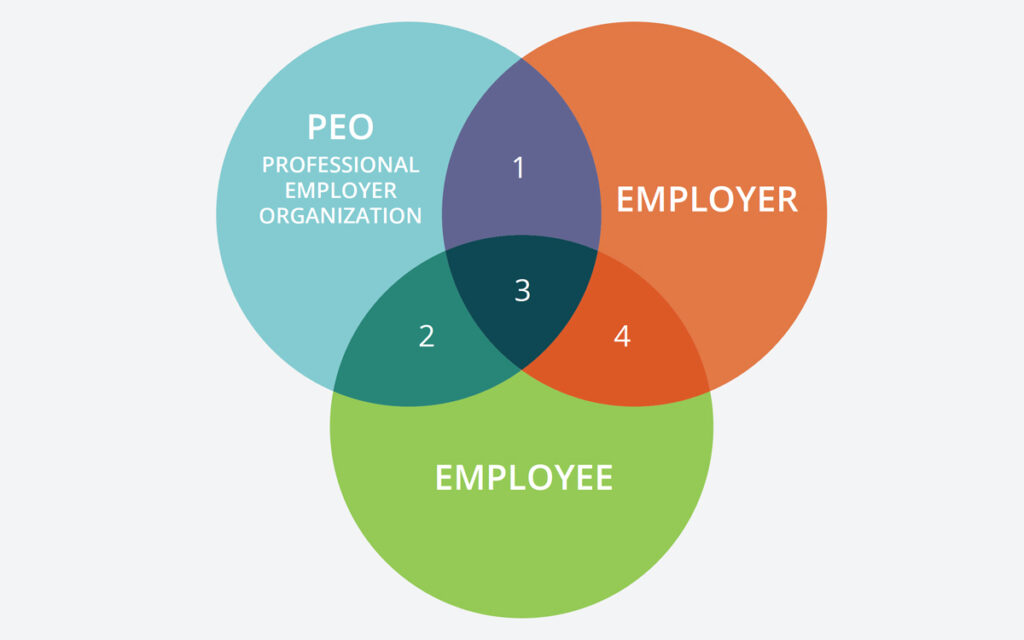A Professional Employment Organization is a suitable alternative if Programs have previously identified an individual for employment activities and an Independent Contractor is not fit. A Professional Employment Organization (PEO) is similar to a temporary staffing agency in that it provides employment services, such as HR and payroll.
A Professional Employment Organization, or professional employer organization, is a sort of co-employment that provides full-service human resource outsourcing. In this arrangement, a PEO manages different employee administrative functions on behalf of a company, such as a payroll and benefits management.
Some PEOs also offer strategic services, but no two are comparable, so it’s crucial to do your homework and evaluate suppliers. Contracting with a Professional Employment Organization provider can be a more cost-effective option than cooperating with a local institution or setting up a foreign payroll, and it may allow for limited or full employment without triggering registration requirements in some situations.
The individual(s) would be employed by the PEO and “leased” to the program in this scenario. In addition to the compensation, the program would pay the PEO an administrative fee. The Professional Employment Organization is in charge of ensuring that all local employment and tax rules are followed, as well as any reporting requirements.
What is a Global Professional Employment Organization, and how does it work?
A global PEO performs all of the tasks of a traditional PEO, such as payroll, benefits, and legal compliance, but for employees based outside of the company’s home country. For organizations developing internationally, especially those looking to hire staff in a range of countries, a global Professional Employment Organization is a vital partner. Employment and remuneration regulations and cultural expectations differ substantially from country to country. A global PEO can assist organizations in successfully expanding into new markets by navigating legal and cultural obstacles.

Who Should Hire a Professional Employer Organization (PEO)?
A PEO may assist any firm in outsourcing HR, financial, and legal administrative responsibilities. Small and medium-sized firms, on the other hand, stand to benefit the most from working with a Professional Employment Organization. Because small and medium-sized enterprises can concentrate on core business processes while outsourcing administrative tasks to a PEO, this is possible. Furthermore, not all organizations have direct knowledge of HR, legal, or tax needs.
These functions can simply be outsourced to PEOs who specialize in them. However, very large and Fortune 500 organizations frequently use a worldwide PEO. The infrastructure and cost of directly employing personnel in each country may outweigh the benefits of having companies in each country. Large organizations, mid-sized companies, and even tiny businesses are likely to use PEOs to help them expand internationally.
PEOs are very useful for businesses trying to grow into new markets, particularly when hiring their first international staff. A global Professional Employment Organization, or one that administers payroll, HR, and benefits for a company with employees in multiple countries, is designed to assist companies in dealing with worldwide business difficulties.
What are the benefits of using a Professional Employment Organization?
With a PEO’s experienced, strategic assistance, you may be able to grow your business while also having peace of mind that you’re better protected.
PEOs commonly assist with:
Payroll and tax preparation
Payroll processing is handled by PEOs, who can also pay local, state, and federal employment taxes in some situations. Many also combine payroll and time and attendance, reducing data entry duplication and errors.
Administration of benefits
Co-employment frequently includes access to high-quality, low-cost health insurance, as well as dental care, retirement benefits, and other employee advantages. Employee enrollment for these benefits and claim processing are normally handled by the PEO.
Compliance
PEOs often have compliance professionals on staff that can assist you in avoiding fines and penalties. Payroll tax law and reporting requirements, unemployment insurance, workers’ compensation, hiring, and HR compliance may all be areas of competence for them.
Taking risks and staying protected
Workers’ compensation insurance is occasionally provided by PEOs in addition to safety audits and training programs. Inspections by the Occupational Safety and Health Administration (OSHA) may also require their assistance.
Assistance with human resources
In many circumstances, a PEO has HR professionals on staff who can assist with HR issues. If you already have an in-house HR person or team, the PEO will collaborate with them on a strategic and administrative level.
Management of talent
Recruiting and strategic hiring, employee training and engagement, and performance management are all services provided by some PEOs.
PEOs and their Functions
Both the business and the PEO have certain employer obligations in a co-employment partnership. The Professional Employment Organization is responsible for processing payroll, withholding and paying payroll taxes, maintaining workers’ compensation coverage, administering employee benefits, and providing human resources advice. This frees you up to focus on day-to-day operations, such as offering products and services to consumers and deciding which staff to hire or fire.
How to pick a professional employer organization?
Shop the co-employment market like you would for any other important business necessity to find the best Professional Employment Organization for your company.
Seek out PEOs that:
- Have a proven track record and a stable financial position.
- Can suit your company’s and workers’ specific requirements
- Provide references from previous clients in your field. Provide thorough help and experience in compliance.
- Wherever you do business, provide services and coverage.
- Are they ESAC-accredited or IRS-certified?
What kind of companies can benefit from PEOs?
Co-employment arrangements are most common in small and midsized firms, although larger organizations can also benefit.
PEOs are a good fit for nearly every industry, including, but not limited to:
- Property management and real estate
- Technology and computer services
- Brokers and dealers in securities
- Services in engineering
- Services in the medical field
- Legal assistance
- Services in management consulting
- Services for businesses
- Accounting, auditing, and bookkeeping are all aspects of accounting.
Manufacturing: Other trades include plumbing, HVAC, electrical, and others.
Insurance: Wholesale\sNonprofits
What is it that it doesn’t do?
Although a Professional Employment Organization may manage HR administration, this does not imply that you relinquish ownership or control of your organization to them.
The following are things a PEO will not do:
- Make decisions about your company on your own.
- Assistance with marketing, sales, or product distribution is available.
- Decide on pay rates, working hours, and timetables.
How much do they cost?
The majority of PEO fees are based on a percentage of payroll, although some charge by the number of employees you have. To acquire a price estimate for a PEO, you’ll usually have to supply information about your personnel as well as your current or intended benefits.
When estimating Professional Employment Organization costs, keep the following in mind:
- A cost analysis is frequently included by reputable providers so you can understand how your contributions will be divided into payroll, benefits, workers’ compensation, and other expenses.
- In-depth services, such as data insights or talent management, may cost more, but they may boost your return on investment. Your time is really valuable.
- Managing HR on your own may divert your attention away from revenue-generating tasks. Various types of outsourcing include PEOs and other types of outsourcing.
PEOs are a sort of HR outsourcing, however, because of the co-employment arrangement, they’re separate.
Other outsourcing services that are similar to PEOs or are frequently confused with them include:
- Employee-leasing firm
- A company that rents out employees
- Administrative services organization (ASO) Managed payroll Human resources outsourcing organization (HRO)

